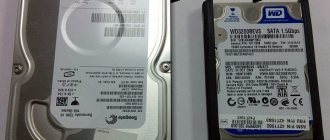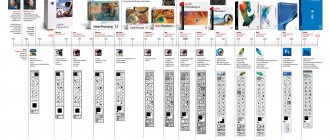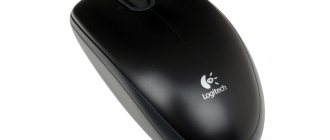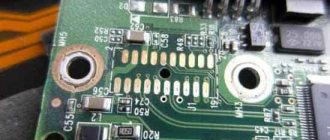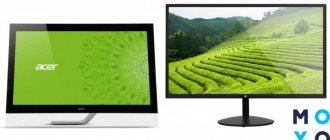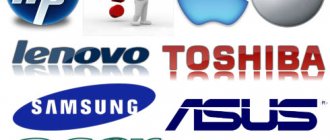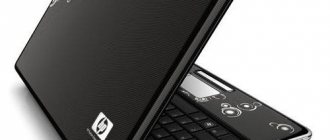Portability
The visible difference between a netbook and a laptop is its significantly smaller display size, body thickness, and weight. If the diagonal of a standard laptop can reach 20 inches and fully replace a monitor, for example, an all-in-one, then for a netbook this parameter is 12 inches maximum. This makes the device lighter and more compact. However, the small screen will not allow you to enjoy a detailed image, so watching movies, playing games and working with spreadsheets on it is not very convenient.
Modern models have such a thin body that the netbook fits into any bag or even pocket. This feature is good for travelers, because the netbook is convenient to use in cafes, transport and other places. It was created for those who need to quickly type a message, read an article, or view files, even in extreme situations.
Interesting read: How to choose a netbook
Flaws
- Low performance - due to the small size of the laptop, it is impossible to fit a good cooling system into it, therefore you cannot use powerful components that generate a lot of heat.
- Upgrade - unlike desktop computers, in which you can replace any component, in a laptop you can only add RAM or replace the drive yourself.
- Difficulty of repair - due to the small size of the parts, disassembly/assembly and repair are difficult.
- Cooling system - it is impossible to ensure good air circulation in the laptop case, as on stationary machines, which is why the power of small coolers is not enough to cool the elements, so they fail.
We can conclude that most of the disadvantages of laptops are due to their compactness, which ensures mobility. People who want to always have a computer with them are faced with the question: what is the difference between a laptop and a netbook, and what to choose? Of course, in order to decide on the choice of device, you need to understand what it will be used for and what tasks will be solved with its help. If this is office work or home use, then it is best to choose a laptop. If your work involves travel and business trips, that is, when conditions do not allow you to take a laptop with you due to its rather large dimensions, then a netbook would be the best option. But dimensions are far from the only characteristic by which a gadget is selected.
| Possibilities | Netbook | Laptop |
| Internet access | + | + |
| Social media | + | + |
| Shares photos, music | + | + |
| Upload photos, music | + | + |
| Listen to music | + | + |
| Watching TV | + | |
| Play online games | + | + |
| PC Games | + | |
| Work with text | + | + |
| Working with charts (cs/cad) | + | |
| Working with audio/video | + |
The following paragraphs detail the differences between the average netbook and a laptop:
Technical characteristics or “iron filling”
When choosing a personal PC, size matters, but not as much as the technical parameters of the devices. The latest generation of laptops from famous brands also boasts an ultra-thin and mobile design. What is the difference between laptop and netbook hardware:
- Processor power . Portable personal computers are designed taking into account the fact that the device is intended not for full-time work, but for additional work. Therefore, developers are more focused on reducing the size than equipping the gadget with modern technologies. Often, the netbook lineup has an Intel Atom processor, which is one of the weakest on the market. The advantage of such equipment is low energy consumption, but the disadvantage is the inability to work with heavy programs.
Some compact laptops from the Apple, Lenovo and Asus brands also run on more powerful hardware - Core m3 and i3, but they are more expensive.
- Video card . The graphic capabilities of a netbook are limited, since the devices have a low-quality controller. Applications and games of the new type will not run on low-budget devices, and on more expensive devices the work will not be as fast and stable as on gaming laptops. Netbooks are not suitable for gamers and graphic designers, photographers and editors who work with complex programs.
- Hard drive size . Portable laptops have much smaller hard drive capacity and are not as fast. SSD drives in netbooks are less than 700 GB, while standard personal PCs can have up to 4 TB. This disk capacity is needed for those who work with a large number of files, download various programs, and watch a lot of audio and video content. To supplement office work or use the device for communicating on social networks, 200 GB, which are available in each netbook, is enough.
- Amount of RAM . RAM on modern laptop models, for example, Asus and Dell, reaches 4 GB, which is enough for work. Netbooks do not replace a computer and do not fill the need for powerful hardware. Designed for fast communication, they are more like a functional tablet with a keyboard. Therefore, if you need to work with a large number of files and programs open at the same time, then it is better to choose the largest volume of OP. For normal use without special loads, you can get by with 2 GB of RAM.
Characteristics of a netbook: how it differs from a laptop
Let's highlight the main features:
Purpose
The main thing that distinguishes the two devices is their primary task. The netbook was designed primarily for mobile use. Of course, no one forbids using a laptop in a cafe, traveling, studying or working. But since it is more bulky, it is therefore not so convenient for these purposes.
In addition, some laptop models can become a full replacement for a desktop computer. A netbook cannot do this. You can say this - it is an addition to the PC.
Therefore, when choosing a suitable laptop computer model, consider the purposes for which it will be used.
Portability
The first thing that catches your eye when choosing equipment is the size of the devices. This is the characteristic that defines the obvious difference between them.
So, the standard laptop screen diagonal is 15.6 inches. The size of the display depends on the diagonal of the display. In addition, models with larger dimensions can be found on sale. Their diagonal can reach 20 inches or more.
Reference. Most often, a large screen can be found on powerful gaming models. They are quite bulky and heavy, so they are intended for home use.
If we talk about a netbook, then for it this characteristic will be 12 inches maximum. This makes it light and compact.
Reference. It is worth keeping in mind that a small screen imposes certain limitations, because it is not able to provide a high-quality picture. Therefore, it is not very convenient to watch movies or work with text editors.
"Iron"
Of course, size plays an important role when choosing the right laptop option. However, they are not as significant as technical characteristics . In addition, the latest generation of laptops from some well-known manufacturers are also distinguished by their ultra-thin design and low weight.
What is the difference in the “stuffing” of a netbook and a laptop:
- CPU. The design of netbooks means that they will become an addition to a desktop computer, and not a full-fledged unit. Therefore, manufacturers equip them with compact, rather than powerful and modern components. This allows them to remain small in size. For example, many models of miniature netbooks are equipped with an Intel Atom processor, which is considered one of the least powerful of all the options presented. This “filling” makes the device economical and inexpensive, while making it impossible to work with “heavy” software. At the same time, some modern laptop models are equipped with a powerful processor, for example, Intel Core i5 or i7. It allows you to work with any programs, even professional software, and play games. However, such models are quite expensive.
- Video card. The miniature computer is equipped with a low-power controller. Therefore, it has limited graphics capabilities. Many programs and games simply cannot run on it. Therefore, if you work with “heavy” software, graphic editors, or like to play video games, give preference to laptops equipped with a powerful video card.
- Hard disk capacity. On some laptop models, the HDD capacity can reach 4 TB. At the same time, it is quite difficult to find a miniature computer on sale even with 700 GB of memory.
- RAM. The RAM of most modern laptop models reaches 4 Gb. This volume is quite enough for watching video files, working with a variety of software, and playing games. In addition, if necessary, the volume can be increased up to 32 Gb. Netbooks cannot boast of a large amount of RAM. For most models it does not exceed 2 Gb.
Keyboard
The keyboard of most laptops is similar to the one used to work with a personal computer. In addition, devices with a screen larger than 20 inches may have additional “gaming” keys.
If we talk about miniature models, their size imposes limitations. Therefore, the keyboard of such devices is devoid of some buttons. For example, here you will not find “hot” buttons or system keys. In addition, the buttons themselves are small, and the distance between them is not maintained. Therefore, it is not very convenient to type large texts on them.
Software
The low-power hardware of netbooks also affects the installed software. Compared to its older “brother”, it is weaker. Therefore, such devices are not suitable for normal operation. Linux OS is integrated on most models. It is lightweight and more optimized for working with low-power gadgets. More modern versions are equipped with a “stripped-down” version of Windows.
Reference. The configuration of the laptops allows you to install any version of the operating system.
Price
Even the most budget laptop will cost more than a netbook with average specs. Therefore, if your goal is to save money, buy a miniature computer. It will be a good assistant for communicating on social networks and Internet surfing.
Laptop and netbook keyboard
The larger the device, the larger the display and keys. Regular laptops have a functional keyboard similar to that of a desktop device, and models with a display larger than 20 inches are also equipped with special gaming keys.
As for netbooks, due to the small size of the case, the keyboard is incomplete and lacks some “hot keys”, additional numeric layout and device control buttons. The keys themselves are small and there is no space between them for convenient printing of large texts. If an office worker is faced with the choice between a laptop or a netbook, then the latter gadget is inferior to the former.
Difference between laptop and netbook software
The technical parameters of netbooks are weaker, so standard operating systems and programs are not suitable for their full operation. For smooth and productive use of the device, it is installed by default with Linux OS, which “weighs” less and is more optimized for low-power PCs.
The disadvantage of the system is the complexity of its operation, as well as the limited application market. For newer netbook models, a specially stripped-down Windows OS is installed. There is no such problem in laptops - you can install any user-friendly software system on them and it will work properly.
Price
The pricing policy for portable PCs with large displays and compact laptops with thin bodies is different: a productive netbook with average specifications will cost less than a low-budget laptop. For comfortable work or quickly searching for information on the Internet while traveling, a netbook is a good price-to-hardware ratio. This gadget is suitable for those who need a device larger than a tablet, but smaller than a computer with an affordable price tag.
Disadvantages of netbooks
However, it is worth paying attention to the fact that increasing battery life without recharging is achieved by degrading the characteristics of the equipment. As a rule, the processor in netbooks is only suitable for browsing the Internet and editing documents. The most powerful models are capable of playing videos in formats up to 720p. Netbooks do not have a discrete video card, which makes it impossible to run graphics applications that require a more or less powerful video card. Netbook hardware is set to energy saving mode.
Netbooks do not have a disk drive, which is also unacceptable if you often work with laser storage media.

